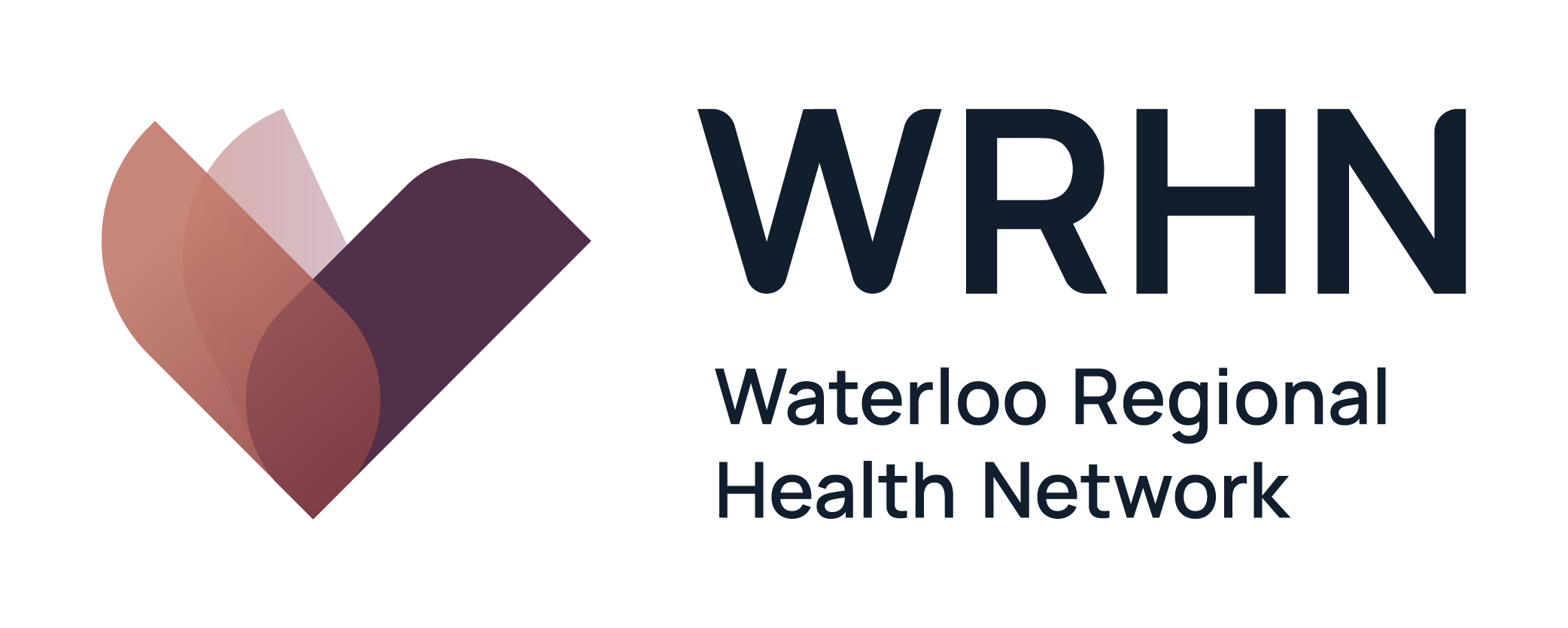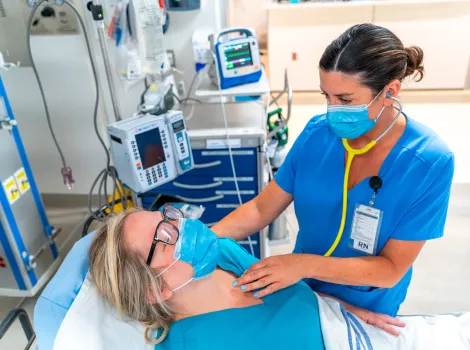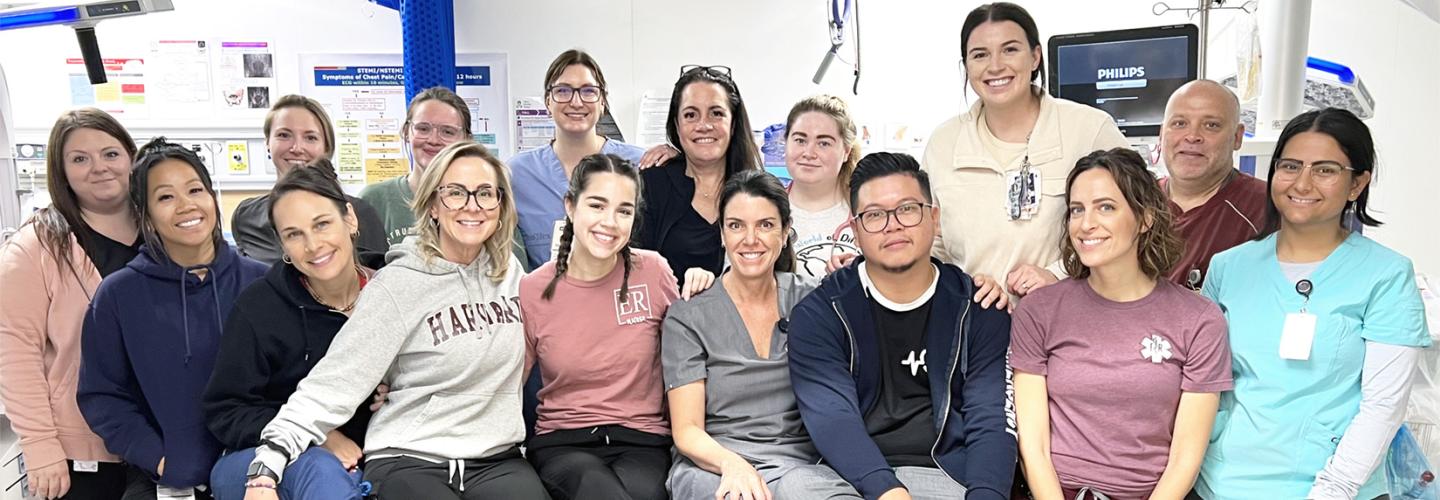Emergency Department
The Emergency Department is a 40-stretcher facility. Our fully qualified emergency physicians and nurses
proudly provide emergency services to over 135 patients each and every day and up to about 50,000+ patients each year.
If you are in need of serious medical attention, call 9-1-1 or go to your nearest Emergency Department.
Cambridge Memorial Hospital’s Emergency Department is here for you 24/7, year-round. Our dedicated and experienced staff treat hundreds of patients a day and are well-equipped to provide you with the best care possible.
If you are experiencing an emergency and require serious medical attention, please call 9-1-1 or go to your nearest Emergency Department.
CMH’s Emergency Department is located at:
700 Coronation Blvd.
Cambridge, ON
N1R 3G2
Park in Lot #2 located at the front of the Hospital – Main Entrance and Emergency Department.
Enter the Emergency Department doors and check-in with the nurse to register as a waiting patient.
Patients are seen based on the urgency of their case. There may be times when your wait is longer than usual.
To learn more about Emergency Departments, watch this informative video by Dr. Mike Evans:
To take a tour of our Emergency Department, watch this video (recorded December 2019, three weeks before opening):
We understand that coming to an emergency department (ED) for you or a family member can be stressful and frightening. Here is a brief overview of what you can expect so you are prepared for your arrival.
Understanding the full scope of your emergency will help us ensure you are provided the best care possible.
Please bring:
- Health Card (OHIP card)
- Photo ID that includes your current address (e.g., driver’s license)
- Current cellphone number, if you have one
- List of any allergies and medications you are taking
- Next of kin (if possible, have a family member, next of kin, or a support person with you)
- A charger for your cellphone or other devices, refillable water bottle, and a sweater
If you think you may be admitted, it is recommended you bring any medications you take regularly with you to hospital.
Please leave any valuable items at home. If you have valuables on you and are admitted to the hospital, please have a family member or loved one take them home.
After arriving at ED, you register with the nurse. You will be called upon to see the triage nurse in order of arrival or based on the urgency of your case. The triage nurse will decide how quickly you need treatment by reviewing a history of your medical condition and a brief physical assessment.
We do our best to treat you as quickly as possible. There may be times when someone who arrived after you is treated first; it is because that person’s medical need may be more serious. The ED does not function on a first-come, first-serve basis; patients with the most serious conditions are seen first.
If you are able, consider making an appointment with your family doctor, at an urgent care centre, or going to a walk-in clinic to avoid waiting in the ED.
Every effort is made to see you as quickly as possible. There may be times when your visit or wait to see a care provider in ED may be prolonged due to a high volume of patients seeking medical attention or more serious cases being treated ahead of you.
While you are waiting:
- If your condition changes and you begin to feel worse, tell the triage nurse at once.
- Do not leave without telling the triage nurse or the volunteer. Leaving before being assessed may worsen your illness or condition.
- Do not eat or drink anything before asking the triage nurse. Some tests cannot be done if you have eaten.
- It may take time for you to be treated, if possible, please leave small children at home in someone else’s care.
- While in ED, please refrain from using camera, video, or audio recording devices in the waiting room or hallways to respect patient, staff, and visitor privacy.
We understand that visiting the ED can be a stressful and frightening experience. Your safety is important to us. Threatening, abusive and/or violent behaviour are not tolerated in the ED. Patients and visitors who are considered to pose a safety risk to other patients, visitors, staff, physicians, or volunteers will be removed from the hospital. We make every effort to treat you with dignity and respect, and expect the same treatment in return.
Emergency departments provide treatment for severe illnesses and life-threatening injuries 24/7 year-round. If you need urgent medical attention for serious illness or injury, call 9-1-1 or visit the nearest emergency department. A doctor or nurse will assess your condition and decide a course of treatment.
There are alternative options; however, when in doubt, go to the emergency department.
Know Your Care Options provides a comprehensive list of alternative options and information on when to visit your family doctor or nurse practitioner, a walk-in clinic, or an urgent care clinic in Waterloo and Wellington Regions.
Doctors4Cambridge provides a list of doctors and nurse practitioners accepting patients in Cambridge.
Ontario Health811 is a free, secure and confidential service you can call (dial 811) or access online 24/7 to get health advice from a registered nurse or find health services or information.
We understand how stressful it can be to feel uninformed and disconnected from your loved one when they are in the ED. We will do our best to keep loved ones up to date while we also prioritize the direct care of patients.
Here are some things you can do to stay informed:
- Come with your loved one to the ED. Most patients are permitted one visitor at a time as it is the best way to stay connected every step of the way. If you are arriving in a separate vehicle from your loved, park in lot #2 and go to the Information Desk in Wing A. Main Lobby or for after hours, ask for assistance from the Triage Nurse in the ED waiting room.
- Stay on speaker phone when the doctor is assessing your loved one. The request to do so must come from the patient if they are capable of their own decision making.
- Call the hospital for an update. If you have tried calling your loved one directly and were unable to reach them, you can call the hospital and follow the prompts for an update. We will do our best to have someone from the care team speak with you.
Please keep these in mind:
- Please designate ONE person to be updated. This will avoid confusion for you and enable our care team to only have to update one person so they are able to focus on your loved one.
- The care team will not provide family updates for patients who are capable of making their own medical decisions, except by request from the patient. This is due to privacy regulations protecting a patient’s personal information.
- If the patient would like someone updated, please ensure they have the correct phone number available.
Cambridge Memorial Hospital is not responsible for patient or visitor belongings. Please do not bring valuables (including cash, jewelry, keys or watches) into the hospital. We understand that an emergency department is not a planned visit. If possible, give your valuables to a friend or family member for safekeeping. Should you decide to bring valuables, please know that it is at your own risk.
If you are admitted to hospital, inform your care team of any valuables so they are labelled with your name. Valuables, if found, may be given to our security for safekeeping, but space is limited. If you find something of yours is missing, please contact the hospital at 519-621-2333.
Cambridge Memorial Hospital, along with all inpatient hospitals in the Province of Ontario, is funded by the Government of Ontario.
Patients who have a valid, Ontario Health Insurance Plan card (OHIP) are covered by this plan. If you do not have a valid OHIP card, you will need to pay upfront for emergency services. This is standard across all hospitals in Ontario.
Patients who are uninsured are required to fill out a short form indicating one of the three options:
- Non-Resident of Canada
- A Canadian resident without valid health coverage
- A Canadian resident with valid provincial or federal health coverage but do not have proof of coverage with you
For private insurance providers, you will need to go through them in order to recover the costs associated with your visit. Most private insurance providers require you contact them immediately upon use of health care services. Please contact them as soon as you are at the hospital.
Fees are paid upfront and do not cover the cost of any lab or medical imaging services, and ambulance fees (among other hospital services). These will be billed separately should you require these services during your visit. If you require surgery or an inpatient admission to hospital, there will be further charges for these services. Learn about Paying Your Bill.
Patients are responsible for the costs of transportation home when you are discharged from an emergency visit.
If friends or family are not available to take you home, or if you require special transportation, please make arrangements with one of the following:
- Taxi or Uber/Lyft
- Wheelchair Taxi
- Private transportation services (i.e., for patients requiring a stretcher)
Please ask your care team if you need assistance arranging transportation. Some services will require you to provide a credit card number. Please have this available.
We welcome feedback about your Emergency Department experience, such as compliments or concerns. If you have tried to resolve your concerns with your care team and you still would like to speak to someone, please contact Patient Relations at patientrelations@cmh.org or ext. 2360.
 If you experience sexual assault or domestic violence in Waterloo Region, there are expert resources available at Cambridge Memorial Hospital for emergency and follow-up care. This service is also provided at WHRN @ Queen's Blvd (formerly St. Mary's General Hospital).
If you experience sexual assault or domestic violence in Waterloo Region, there are expert resources available at Cambridge Memorial Hospital for emergency and follow-up care. This service is also provided at WHRN @ Queen's Blvd (formerly St. Mary's General Hospital).
Your security, dignity and privacy during this difficult time is a priority. Our dedicated and skilled team of physicians, social workers and nurses, who work closely with clients of sexual assault and domestic violence are here to support you. They work in partnership with many local resources geared towards helping you receive the best care and support throughout your journey.
Sexual Assault and Domestic Violence Care Centre of Waterloo Region is a 24/7 on-call team of nurses and social workers - the only care team of its kind in Ontario - that respond to the needs of individuals who have experienced sexual assault or domestic violence. To access this team, visit the Emergency Department at Cambridge Memorial Hospital or WHRN @ Queen's Blvd. Confidential treatments will be offered for those accessing the team.
Sexual Assault is any non-consensual act of a sexual nature, which may include physical contact, coercion, or any form of unwanted sexual activity, including, but not limited to, unwanted kissing, fondling and rape. If you know that you have been sexually assault or think you may have been, we offer options for you to decide on what you think is best for you. All of our services are confidential and free of charge, including medications.
Your choices include:
- Immediate crisis support
- Police involvement
- Preventative medications for sexually transmitted infections, pregnancy and HIV
- Physical examinations
- Collection of forensic evidence
- Counselling

Specially trained pediatric sexual assault nurse examiners and social workers provide assessment and support to child victims of sexual assault and their families. Children are connected to Child Assessment of Sexual Abuse (CASA) through Waterloo Regional Police Service or Family & Children’s Services of Waterloo Region.
Domestic violence is abuse experienced by someone in a current or past intimate relationship. It may be emotional, psychological, financial or physical. If you are in an abusive relationship we can help. We will offer you options to help with your situation. They are at no cost to you.
Your choices include:
- Immediate crisis support
- Treatment of injuries
- Police involvement (if not already involved)
- Documentation of injuries
- Safety planning for you and your children
- Connections to community supports
- Counselling
Visit the Emergency Department at Cambridge Memorial Hospital. The team will be contacted to meet you in private. If you are in immediate danger or crisis now, please call 9-1-1.
Contact Information
Christine Taylor
Program Manager
519-749-6994 ext. 1370
Don’t call the Emergency Department to ask how long the wait times are. Please check our Emergency Wait Time page. Your waiting time will depend on your condition, the number of patients seeking emergency care and the severity of the cases that need to be treated.
All patients are treated according to need. If someone comes in after you and they require immediate care, they will be seen before you. Likewise, if you are in need of urgent care, you will be seen sooner.
Emergency care is offered first to those who need care the most (e.g., heart attacks, severe bleeding, etc.). We cannot offer appointments or put your name on the waiting list prior to your arrival. You must be assessed by a triage nurse to determine the severity of your condition.
We cannot offer advice over the phone. You must be assessed by a triage nurse to accurately determine the severity of your condition.
Schedule:
The Emergency Department is open 7 days a week, 24 hours a day
Phone: For an Emergency Please call 911
Telehealth Ontario
Telehealth services are also available in the community. This free telephone service may be helpful in deciding if a visit to the hospital is recommended. Call 1-866-797-0000.
This service is available 24 hours a day, seven days a week. It is a free, confidential telephone service provided by Teleheath Ontario. You can call the service to get health advice or general health information from a Registered Nurse. The nurse can help assess your symptoms and help you decide your next step.
A call to Telehealth Ontario does not replace dialing 911 in an emergency. Dialing 911 is the only number you should call in emergency situations.
To use Telehealth services, you do not need to provide your O.H.I.P. number, and all information is confidential.
Telehealth Ontario services are provided in English and French, with translation support for other languages and TTY access for callers with hearing and speech difficulties. Callers can also be connected with medication information and informative audio tapes.
For Adults:
- chest pain
- difficulty breathing, unexpected heavy breathing or shortness of breath
- severe bleeding or head trauma
- sudden onset of weakness, dizziness
- loss of consciousness
- severe abdominal pain
- injuries to eyes, hands, ears
- sudden change in speech or vision
- broken bones
- major sprains
For Children:
In addition to the adult list, bring your child to the emergency department if they:
- have persistent fever(>38.5 ºC/100.4 ºF)
- have persistent vomiting/diarrhea
- will not eat or drink ~ particularly young children
While not complete, the following list is a guideline of problems suitable for your family doctor, nurse practitioner or an urgent care clinic.
- Minor burns or injuries
- Sprains and strains
- Coughs, colds, and sore throats
- Ear infections
- Fever or flu-like symptoms
- Skin irritations (rashes)
- Mild asthma
- Prescription renewals
- Investigation of chronic problems
If you have a minor health problem, you may consider the following options:
- Call your family doctor or nurse practitioner first. Several family physician networks now offer after-hours and weekend care. Check out the "Know your Options" pamphlet for services in Waterloo Wellington regions.
- If you do not have a family doctor, contact Health Care Connect (1.800.445.1822) to register for a doctor.
To learn who is accepting new patients in Cambridge and surrounding area, connect with Doctors 4 Cambridge - Need a Doctor (the list will be kept up-to-date as best as possible - there are times when the webmaster is not informed the physician is not accepting anymore). - Click for a list of Regional Walk-in Clinics.
- Call TeleHealth Ontario at 1.866.797.0000 to speak with registered nurses who can answer health-related question.



